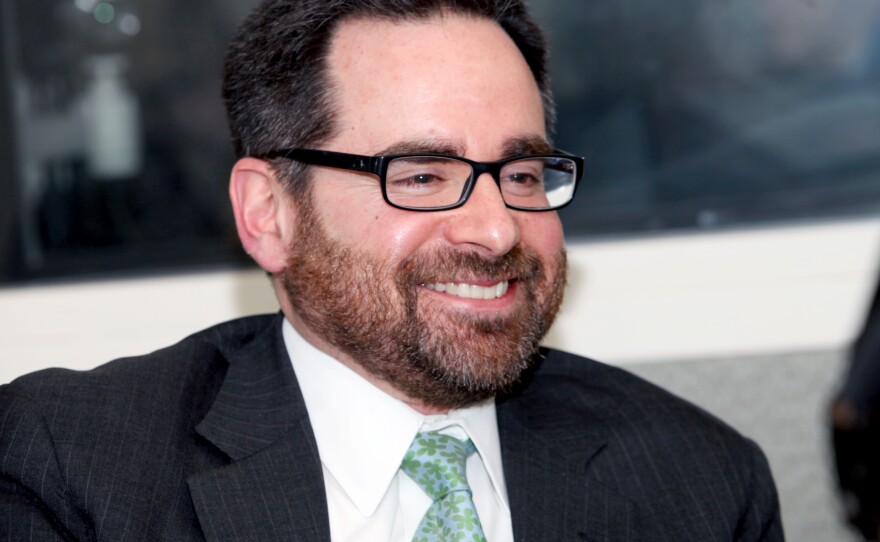In the wake of President Donald Trump's decision to withdraw the U.S. from the Paris climate agreement, Governor Dannel Malloy announced last week that Connecticut will join with other states to uphold its principles.
The coalition, calling itself the United States Climate Alliance, has said it is not only committed to the Paris climate agreement, but also in furthering steps to tackle climate change.
In a statement, Malloy said Connecticut "has been a national leader in combating climate change and we have no plans of slowing down our efforts."
WNPR spoke with Rob Klee, Commissioner of Connecticut's Department of Energy and Environmental Protection. His agency is responsible for implementing and overseeing Connecticut's climate efforts.
Klee said Trump's withdrawal from the accord was disappointing.
Rob Klee: The decision is really wrong on the science. It's the wrong side of the international consensus. It's [the] wrong side of where the public is in the United States. It's on the wrong side of our major corporations -- even members of his own administration, including folks who I think know a thing or two about risks associated with climate change. It's pretty much a wrong decision on all accounts.
WNPR's Ray Hardman: When the U.S. was abiding by the accord, was Connecticut affected in any way? I understand these are non-binding resolutions, but did Connecticut change the way that it was doing environmental policy because of the Paris climate accord?
Well, Connecticut has always been a leader on combating climate change, and thinking both about reducing our greenhouse gas emissions and adapting to the inevitable changes in the climate that we're already feeling in Connecticut, as a coastal state with a lot of rivers. So we were well on the path, and probably beyond the path, of where Paris was taking us.

We know that a certain amount of air pollution in Connecticut can be attributed to coal-fired power plants in the Midwest. Does breaking with the Paris climate accord mean we could potentially see more air pollution from those plants?
It does, and that sends the absolute wrong signal, because Connecticut is downwind from basically everyone, and we breathe the air that coal-fired power plants produce in Indiana, West Virginia, Ohio, Pennsylvania, and elsewhere. And those are the criteria air pollutants that create smog and ozone.
That directly impacts the ability of our kids and elderly and those with respiratory distress or asthma to breathe. So to the extent that Trump's administration is giving them a green light to pollute, we will fight with every tool we have to prevent them from doing that.
Governor Malloy has announced that the state of Connecticut will be joining the United States Climate Alliance, a coalition of states that are committed to upholding the Paris climate agreement. I would imagine you're behind that.
Absolutely. And again, this is another place where our governor has shown leadership amongst his fellow governors. This coalition of the willing is a place where we're going to share best practices and our experiences and things that we've already been doing in Connecticut -- like our first-in-the-nation Connecticut Green Bank, which is showing how you can leverage private capital to do clean energy and efficiency programs; or our nationally recognized efficiency programs. And again, a coalition of willing states, when you start adding those up, are pretty substantial.
We punch above our weight in Connecticut, but we're always happy to be alongside our friends in California and New York. And when those types of states and others sort of join together, it's a pretty large statement of what is possible.
Remind us why a continued commitment to the Paris climate accord is so important.
Well, it's important on a number of fronts. This is about the future of our state, and the folks that live in it: my kids, and their kids, and grandkids. It's the future of the planet at stake. And it really is the scientific consensus that this is a global challenge, but it is one that we think we can meet -- and we can meet through ingenuity, through technological advances, by putting people to work in clean tech jobs, and in efficiency jobs.
We can do that through innovation, like we’ve seen from our major companies. And that's why it's important to be a leader, and be in this space, and be out in front in this space.
What we're so disappointed with is that backing out of Paris is basically the United States ceding the ground to the rest of the world to take the leadership role on this most fundamental issue of our time.






